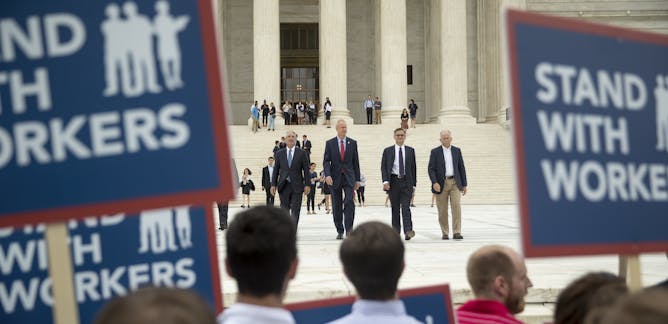Editor's note
|
|
The Supreme Court dealt a mighty blow to organized labor yesterday by barring them from requiring workers they represent to pay dues. Is this another nail in the coffin for American labor? Not quite, argues Ruben J. Garcia, co-director of the UNLV Workplace Law Program. His research focuses on unions in Nevada, which have operated under the same constraints for decades and thrived. He highlights three lessons all unions could take from Nevada.
The Janus decision has an unusual twist, writes Wayne State legal scholar Robert Sedler. It expands the First Amendment “right of silence,” the guarantee that people cannot be forced to be associated with an idea they do not believe. And Arizona State education professor Sherman Dorn looks at how Janus will impact the ability of teachers to work for social change.
Between 1999 and 2015, the suicide rate in the U.S. rose by more than 30 percent. But in most of Europe, numbers have sharply declined. Why? Research is scant, but Wayne State’s Steven Stack unpacks some of the possible reasons the U.S. might be a tragic outlier.
Millions of people around the world don’t have any legal claim to the land they live and work on, even if they’ve been there for generations. Scholar Nir Kshetri looks at how countries are testing blockchain-based property record-keeping to help some of the world’s poorest people.
|
Bryan Keogh
Economics + Business Editor
|

|
|
Top stories
|

Nevada unions have been successful in part because of their political engagement.
AP Photo/Isaac Brekken
Ruben J. Garcia, University of Nevada, Las Vegas
While the Supreme Court's Janus ruling dealt a blow to organized labor, three lessons from Nevada's unions suggest things aren't as bleak as they appear.
|
|

Robert A. Sedler, Wayne State University
The Supreme Court's Janus ruling extends strong protection to the First Amendment 'right of silence' and continues their trend of expanding First Amendment rights, often at the behest of conservatives.
| |

Sherman Dorn, Arizona State University
The Janus decision by the Supreme Court is a serious legal and financial blow to unions and their hundreds of thousands of members. But it will not kill public-employee unions or teachers' unions.
|
|
|
|

The US suicide rate rose 30.4 percent between 1999 and 2015.
hikrcn/shutterstock
Steven Stack, Wayne State University
Most European nations have seen suicide rates fall by 20 percent or more. Research is limited, but some studies blame US inequality.
|

Many rural farmers in India lack clear ownership of the land they work and live on.
AP Photo/Anupam Nath
Nir Kshetri, University of North Carolina – Greensboro
Without secure records of property ownership, many poor people around the world have trouble improving their economic situations. Several countries are already trying blockchain-based land registries.
|
Health + Medicine
|
-
Luís Fernando Tófoli, Universidade Estadual de Campinas; Dráulio Barros de Araújo, Federal University of Rio Grande do Norte (Brazil); Fernanda Palhano-Fontes, Federal University of Rio Grande do Norte (Brazil)
Ayahuasca has long been used for indigenous healing and spiritual rituals. Now, a Brazilian clinical trial has confirmed that this psychoactive drink can help those with even severe depression.
-
Daniel R. Weinberger, M.D., Johns Hopkins University
Separating children from their parents is not just a psychological stress, it's a DNA stress. Scientific research shows that early life stress may have irreversible effects on how DNA works in the cells of the body.
-
Timothy Welty, Drake University
A drug made from a molecule produced from cannabis gained approval from the FDA on June 25. But the molecule, CBD, is decidedly different from some other ingredients in cannabis: It doesn't result in a high.
|
|
|
|
|
|
|
|
Environment + Energy
|
-
Don Fullerton, University of Illinois at Urbana-Champaign; Julian Reif, University of Illinois at Urbana-Champaign; Megan Konar, University of Illinois at Urbana-Champaign; Tatyana Deryugina, University of Illinois at Urbana-Champaign
Crop insurance cushions farmers against natural disasters, but it also can lead them to overuse resources and reduce their incentive to adapt to climate change.
-
Jane Kolodinsky, University of Vermont
Vermonters' views on labels for genetically engineered foods shed light on consumers' views, as the federal government considers mandatory labels.
|
|
|
|
Trending on site
|
-
David Prologo, Emory University
Trainers and fitness gurus often tell their charges how to 'burn fat.' But what does that actually involve? Here's a Speed Read on something that actually takes a fairly long time.
-
Gordon Adams, American University School of International Service
President Trump is criticized for wreaking havoc on the international order, where the US was the established leader. But Trump is simply hastening a change that has been a long time coming.
-
Randy Malamud, Georgia State University
Globalism has made it easier than ever to visit faraway places – and easier to never really leave home while you're there.
|
|
Today’s chart
|
-

 |
Douglas Massey
Princeton University
|
| |
| |
| |
|
|